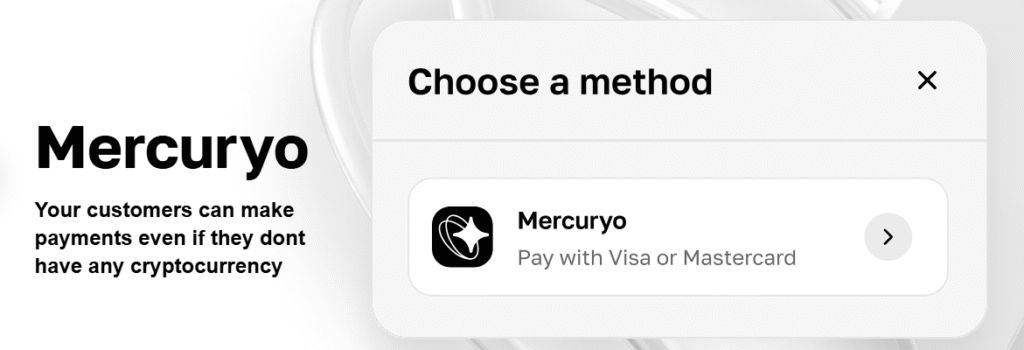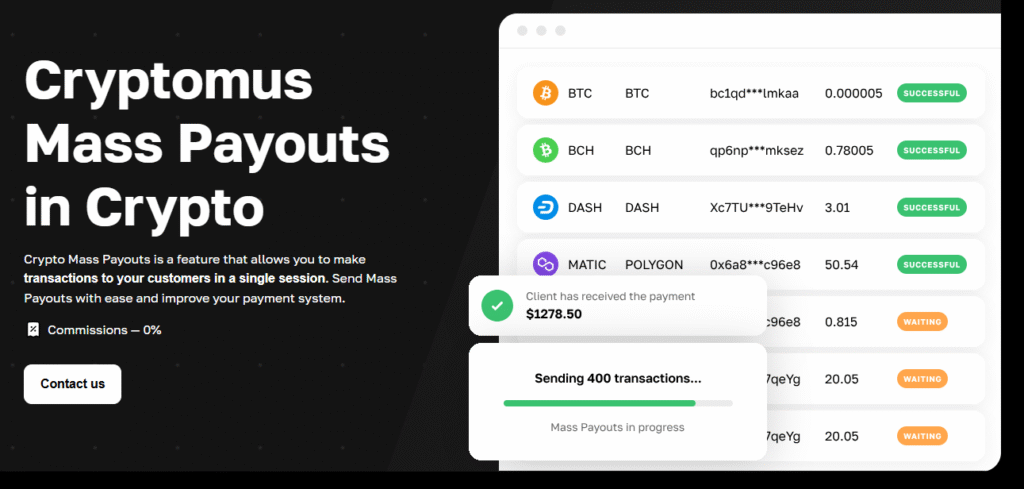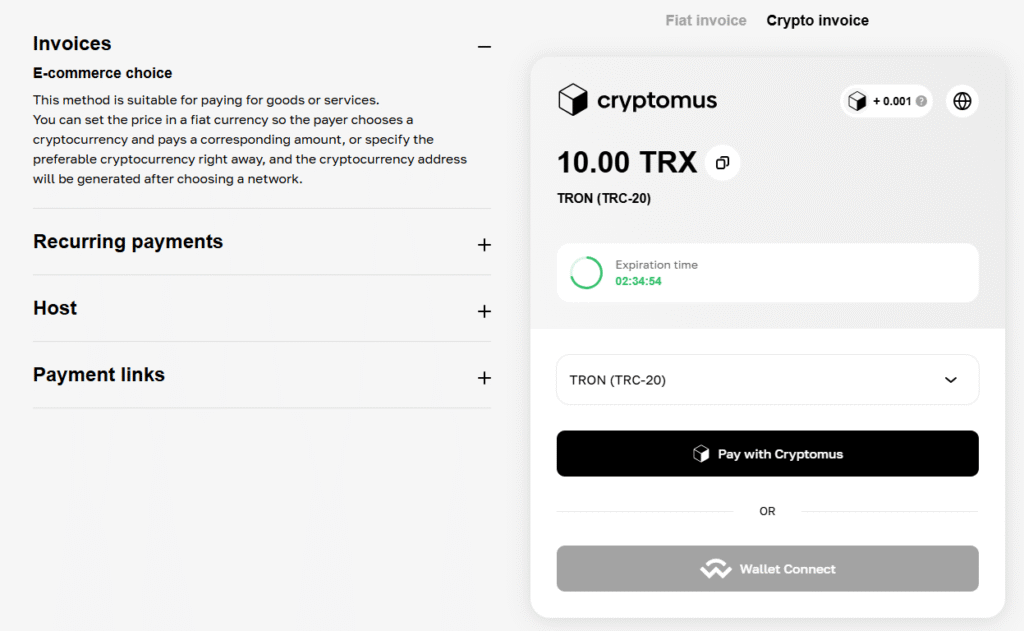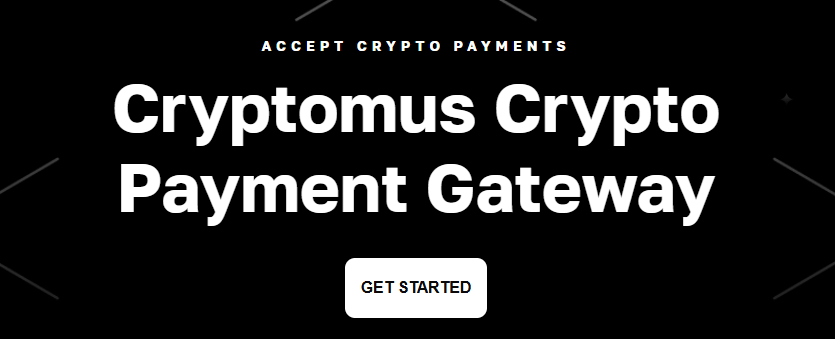Crypto payment gateways make it possible for a business to accept crypto payments on its website.
Over the past few years, I’ve noticed how fast cryptocurrency has grown in finance- not just as an investment, but also as a way to pay online. More and more people want to pay by Bitcoin and other coins.
One big reason is that a good crypto to fiat payment gateway lets you get paid in crypto but receive your money in regular currency, like dollars or euros. This way, you don’t have to stress about price changes in crypto as you get the best of both worlds.
I’ve tested different gateways myself, and in this guide, I’ll share the best ones I’ve found. And just to give you a sneak peek, my #1 recommended gateway is Cryptomus, because it really stood out during my testing.
What is a Crypto Payment Gateway?

A crypto payment gateway is basically a tool that helps businesses accept payments in cryptocurrencies, like Bitcoin or USDT, just like PayPal or Stripe does with normal money – fiat.
The big difference from a traditional payment gateway is simple:
- A traditional gateway only works with regular currencies (dollars, euros, etc.).
- A crypto gateway works with digital coins, and in many cases, it automatically turns them into cash (fiat) so you don’t have to hold crypto if you don’t want to.
The benefits of using a crypto payment gateway like Cryptomus are clear:
- Security: transactions are protected by blockchain technology.
- Speed: payments usually confirm in minutes, much faster than some bank transfers.
- Anonymity: buyers don’t always need to share sensitive card details.
- Cost savings: lower fees compared to traditional payment processors.
How Do Crypto Payment Gateways Work?
Here’s how it works in practice:
- A customer goes to your website and chooses to pay with crypto.
- The gateway generates a wallet address or a QR code for that payment.
- The customer pays using their crypto wallet (like sending Bitcoin or USDT).
- The payment gateway checks the blockchain to confirm the transaction.
- Once confirmed, the business gets the payment — either in crypto or automatically converted into stablecoins or fiat (like USD or EUR).
This method of collecting payments is super useful for merchants because:
- It’s easy to accept crypto payments on a website without needing to handle all the tech behind it.
- Converting to stablecoins or fiat protects you from crypto price swings.
- Integration with your online shop or platform matters a lot — the smoother it is, the easier it is for customers to pay, which means more sales for you.
READ ALSO: 23 Best Crypto Tax Software of 2025.
13 Best Crypto Payment Gateways (2025 Edition)
I’ve tested a bunch of gateways to see which ones really make life easier for businesses. Here are my top picks, starting with the one I recommend the most.
1. Cryptomus (My #1 Recommended)

Cryptomus quickly became my favorite of all Crypto payment gateways. What stood out right away is how easy it is to set up and start accepting crypto payments on a website. Even if you’re not super technical, the integration is smooth and beginner-friendly.
Here’s why I rate it so highly:
- Instant crypto to fiat conversion: you don’t have to worry about price drops because your payments can automatically switch to regular money (like USD or EUR).
- Low fees: compared to others I tested, Cryptomus keeps more money in your pocket.
- Strong security: everything runs smoothly and feels safe, which matters a lot with crypto.
- Clean, user-friendly dashboard: I liked how simple it was to track payments and manage settings.
- Supports mass payments in case you want to pay members of staff at a set time.
- Supports recurring payments.
Overall, if I had to pick just one gateway for 2025, Cryptomus would be it.
2. Coinbase Commerce

Coinbase Commerce is one of the most popular Crypto payment gateways, especially because it connects directly with Coinbase. If you already use Coinbase for trading or storing your crypto, this might feel very familiar.
The good:
- Easy to link with Coinbase accounts.
- Supports several major cryptocurrencies.
- Trusted brand with a solid reputation.
The not-so-good:
- Higher fees compared to some others.
- A bit less flexible than gateways like Cryptomus.
It’s a good option if you’re already in the Coinbase ecosystem, but not my first choice if you’re looking for the best mix of features and cost savings.
3. Binance Pay

Binance Pay is a solid choice if you’re already using Binance. Since it’s built right into the Binance ecosystem, it’s really convenient for people who trade or hold their funds there.
What I noticed is that it feels best for crypto-native businesses — ones that are already comfortable with Binance tools and don’t mind keeping payments in crypto.
The upside: smooth transactions, zero fees between Binance users, and a big global reach. The downside: it’s not as simple for beginners, especially if you’re new to Binance.
4. BitPay

BitPay is one of the oldest and most trusted names in Crypto payment gateways. A lot of big companies use it, and for good reason — it’s reliable and has a strong reputation.
When I tried it, the setup was straightforward, and it does the job well. But the catch is that it’s not always the cheapest option. Some of the fees felt higher compared to newer gateways.
If brand trust and long track record matter to you, BitPay is a safe pick. But if you’re focused on saving money, there are better choices.
5. CoinGate

I found CoinGate to be very flexible. It supports a wide range of cryptocurrencies, which is great if you want to give your customers more options beyond just Bitcoin.
One big plus is fiat settlement — meaning you can accept crypto but get paid in your local currency. That’s a big help for avoiding the ups and downs of the crypto market.
Overall, CoinGate feels like a practical, well-rounded choice for online shops and service businesses that want flexibility.
6. NOWPayments

NOWPayments is one I really liked for its easy integrations. If you run an online shop or even want to accept donations in crypto, it’s quick to set up. They offer plugins for popular platforms like WooCommerce and Shopify, which makes life easier if you’re not a developer.
It supports a wide range of coins, and you can also choose automatic conversion into stablecoins or fiat. For small businesses or creators, this one’s very handy.
7. BTCPay Server

This one’s a little different. BTCPay Server is open-source and free, which makes it very appealing if you don’t want to rely on a third-party service.
The trade-off is that it’s not plug-and-play. You’ll need some technical skills to set it up and customize it. For developers or businesses that want full control and independence, it’s a fantastic option. For beginners, though, it can feel overwhelming.
8. GoCoin
GoCoin stood out for supporting not just Bitcoin, but also Litecoin and Dogecoin. It’s not as big as some of the other gateways, but it does its job well if those coins are important to your business.
I’d call this one more of a niche solution. It doesn’t have all the bells and whistles, but it’s effective for merchants who just want straightforward payments with a few specific coins.
9. TripleA

TripleA feels very professional and compliance-focused. It’s a licensed provider, which gives it an extra layer of trust, especially for businesses that need to follow strict regulations.
It supports both crypto payments and instant fiat conversion, and I found the platform smooth to use. If your business values regulation and wants to avoid any gray areas, TripleA is a solid pick.
10. PayPal (Crypto Payments)
Almost everyone knows PayPal, and now they’ve stepped into crypto payments too. The big advantage here is familiarity — customers already trust PayPal, so they’ll feel comfortable using it.
That said, it’s still limited. Not every country has access, and the fees are higher compared to dedicated crypto gateways. Still, if you want something mainstream-friendly that customers recognize right away, PayPal is worth considering.
11. Alchemy Pay
Alchemy Pay is a Crypto payment gateway strong in Asia, and it focuses on being a bridge between fiat and crypto. This makes it really useful for businesses that want to serve international customers.
What I liked about it is how it connects crypto payments to traditional systems, like bank cards and local payment methods. If your audience is global, Alchemy Pay can make transactions much smoother.
12. SpicePay
SpicePay is simple and gets straight to the point. The main thing I noticed is its instant conversion feature — so if you don’t want to hold crypto, you can quickly swap payments into fiat.
It also has global availability, which makes it good for businesses that operate across multiple regions. It doesn’t have as many extra features as some of the bigger gateways, but it’s a solid, reliable option.
13. CoinsPaid
CoinsPaid feels more like an all-in-one crypto ecosystem rather than just a payment gateway. It handles payments, wallets, and even exchange services in one place.
It’s especially popular in iGaming and other high-risk sectors where traditional payment systems often create hurdles. If your business operates in those industries, CoinsPaid could be a powerful solution.
How to Choose the Right Crypto Payment Gateway for Your Business

With so many options out there, picking the right crypto payment gateway can feel overwhelming. From my testing, here are the main things you should look at before making a decision:
- Transaction fees: Some gateways charge more than others, and those fees add up fast. A lower fee means you keep more of your earnings.
- Supported cryptocurrencies: Make sure the gateway accepts the coins your customers actually use. Bitcoin and Ethereum are common, but many people also pay with USDT, Litecoin, or others.
- Fiat settlement options: If you don’t want to hold crypto, choose a gateway that lets you instantly convert payments into dollars, euros, or your local currency. This protects you from crypto price swings.
- Ease of integration: The easier it is to connect the gateway to your website or online store, the faster you can start accepting payments. Some even have plugins for Shopify, WooCommerce, or WordPress.
- Security & compliance: Look for gateways that focus on safety and follow local regulations. This protects both your business and your customers.
Why Use a Crypto to Fiat Payment Gateway?
One of the biggest challenges with crypto is volatility — prices jump up or drop down within seconds. For businesses, that’s risky. Imagine selling a $100 product, but by the time you convert the crypto you received, it’s only worth $85. Not good.
That’s why a crypto to fiat payment gateway is so useful. It lets you accept crypto from your customers, but instantly change it into regular money (like dollars, euros, or pounds). This way, you don’t lose out when the market moves.
Some industries that benefit the most from this are:
- E-commerce stores – selling goods worldwide without worrying about currency exchange.
- Freelancers and digital services – getting paid by international clients quickly.
- Travel and hospitality – hotels, airlines, and tour operators can serve crypto users while still receiving fiat.
- High-risk industries – businesses where traditional banks make payments harder or more expensive.
How to Pay with Bitcoin Online
If you’ve never paid with Bitcoin online, here’s what it usually looks like from the customer’s side:
- Choose Bitcoin as the payment option – when checking out, just like you’d normally choose “credit card” or “PayPal.”
- Get the payment details – the website shows a wallet address or a QR code.
- Send the payment from your wallet – open your Bitcoin wallet app, scan the QR code (or copy the address), and confirm the payment.
- Wait for confirmation – the gateway checks the blockchain, usually within a few minutes.
- Merchant gets paid – once it’s confirmed, the business receives the funds, either in Bitcoin, stablecoins, or fiat currency.
Final Thoughts on Best Crypto Payment Gateways

Choosing the right crypto payment gateway is a big decision, but it can really pay off. The right gateway makes it simple to accept crypto from customers around the world while protecting your business from price swings and high fees.
After testing many different options, I can confidently say that Cryptomus is the #1 recommended crypto to fiat payment gateway for businesses in 2025. It’s easy to use, affordable, secure, and makes accepting crypto on your website stress-free.
If you’ve been thinking about adding crypto payments to your business, now’s the time. The demand is only growing, and with the right gateway, you can start accepting crypto today without any of the usual headaches.
FAQs on The Best Crypto Payment Gateways
1. What is the best way to accept crypto payments on a website?
The easiest way is to use a crypto payment gateway like Cryptomus. It lets you add a payment option to your website quickly, without having to manage wallets or code everything yourself.
2. How to pay with Bitcoin online safely?
When paying with Bitcoin, always double-check the wallet address before sending. Using a trusted gateway also helps, because it ensures your payment is verified securely on the blockchain.
3. Which crypto to fiat payment gateway has the lowest fees?
From my testing, Cryptomus offers some of the lowest fees while still providing instant fiat conversion. Other gateways often charge more, which eats into profits.
4. Can I receive payments directly in my bank account?
Yes. Many gateways (including Cryptomus, BitPay, and CoinGate) offer fiat settlement, meaning your crypto payments can be instantly converted and sent straight to your bank account.
